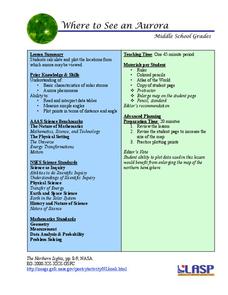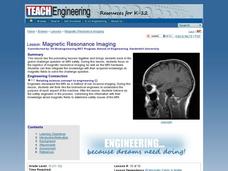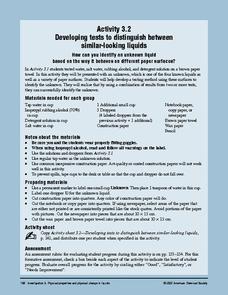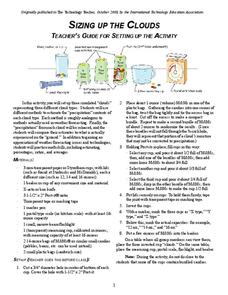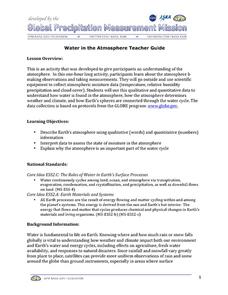Flipping Physics
AP Physics 1: Simple Harmonic Motion Review
Does your class feel unprepared for the upcoming exam? Use this video to review the simple harmonic motion concepts that will appear on the AP Physics exam. While maintaining interest and a fast pace, the presenter not only reviews the...
PHET
Where to See an Aurora
Where can you see an aurora in North America? After completing an astronomy activity, scholars can locate the exact coordinates. Pupils plot points of the inner and outer ring of the auroral oval and answer questions based on their...
Royal Society of Chemistry
A Giant Silver Mirror Experiment
Mirror, mirror, on the wall ... who's the best chemistry teacher of them all? You'll get the vote for certain after your class completes the Silver Mirror experiment! Partnered pupils use Tollen's reagent and glucose to silverplate a...
NOAA
El Niño
El Nino, La Nina ... and the Santa Maria? The 11th installment of a 23-part NOAA Enrichment in Marine sciences and Oceanography (NEMO) program explains the mechanism of El Nino/Southern Oscillation. Pupils use previous data to determine...
NOAA
Currents
Learn how ocean currents are vital to humans and marine life. The eighth installment of a 23-part NOAA Enrichment in Marine sciences and Oceanography (NEMO) program, focuses on ocean currents and how they affect global climate. The...
American Physiological Society
Did I Observe it or Infer it?
Take the mystery out of inquiry! When young scientists learn to use their keen powers of observation to make smart inferences about a situation, they are well on their way to understanding what the scientific method is all about. Using...
Curated OER
Exploring Seasonal Shadows and Sunlight
What can shadows tell us about the changing season? Over several months, astronomy learners record length and position of an outdoor object's shadow, such as a flagpole. They apply the data to a growing hypothesis and note the patterns...
Teach Engineering
Magnetic Resonance Imaging
The capstone lesson in a 14-part series focuses on the basics of magnetic resonance imaging and the hardware of the machines. Pupils use this information and the material learned throughout the unit to develop a presentation on safety...
Baylor College
The Variety and Roles of Microbes
Mini microbiologists play a card game in which they group microorganisms by groups: virus, fungus, protist, or bacteria. Then they identify the roles different microbes play in the natural world and explore how humans effectively use...
American Chemical Society
Developing Tests to Distinguish Between Similar-Looking Liquids
Each group talks about how to test unknown liquids based on their findings in the previous experiment. In this second of four activities, they test unknowns on wax paper, newspaper, and construction paper. As a stand-alone, this lesson...
IOP Institute of Physics
Physics in Concert
What do physicists and musicians have in common? A lot more than you might think. After first viewing a slide show presentation and completing a series of skills practice worksheets on the physics of light, sound, and electricity, young...
International Technology Education Association
Sizing Up the Clouds
How much rain can that cloud make? Through a simulation, the class estimates the amount of candy rain contained in different cup clouds. After probing the clouds using different methods, class members adjust their estimates. Participants...
NOAA
Technology II
Ping, ping, ping. The last installment of a 23-part NOAA Enrichment in Marine sciences and Oceanography (NEMO) program explores technology use in marine studies, such as sonar. Activity involves simulating sonar techniques to identify a...
Energy for Keeps
Going for a Spin: Making a Model Steam Turbine
Discover the effectiveness of wind, water, and steam as energy sources. The hands-on activity has young scientists create a turbine from common materials. After constructing the turbines, they use wind, water, and steam to turn them and...
American Physiological Society
How Does the Density of a Liquid Affect the Buoyancy of an Object?
Here's a lesson plan that will really float your boat! Introduce physical science scholars to the relationship between buoyancy and density through an assortment of individual and collaborative exercises. Lab groups work together to...
Beyond Benign
Packed Up Properties
Determine physical properties of potential packaging materials. Continuing from previous lessons in the series, the resource asks groups to identify physical properties of the substances. They test for conductivity, solubility, water...
Nuffield Foundation
Investigating Anti-Microbial Action
Join the fight against bacteria. An open investigation shows pupils different aspects of antimicrobial substances, such as disinfectants, deodorants, or plant oils. They design and conduct their own experiments on the effectiveness of...
Curated OER
Water in the Atmosphere
A slide show serves as the backdrop for a lesson on the moisture in Earth's atmosphere. Through it, mini meteorologists learn about the attributes of the atmosphere and actually use data-collecting weather tools to make observations and...
Curated OER
Water in the Biosphere
Environmental explorers examine the campus and take note of living organisms. Introduce them to the biosphere and the questions of the day: How much water can be found in the biosphere? A slide show helps you along, and even contains a...
Curated OER
The Marvels of Mud
Young scientists roll up their sleeves and get a little dirty in this three-day earth science investigation. Following the scientific method, children monitor the growth of algae in pond water samples in order to determine the role that...
Atkins
Attack of the Viruses!
Not all viruses are bad, but are all retroviruses groovy? The lesson starts with a detailed presentation before scholars create their own model of a virus. The resource incorporates many worksheets and practice questions to reinforce the...
Space Race
Sensory Detectives
Test your learners' sensory awareness with three hands-on activities that ask pupils to use their other senses to identify and describe everyday objects hidden from sight.
Flipping Physics
AP Physics 1: Electricity Review
Are your scientists needing a review of the electricity concepts that will appear on the AP Physics test? This fast-paced video offers a comprehensive review of the topic. It also includes common misconceptions and test-taking tips.
Flipping Physics
AP Physics 1: Equations to Memorize
Saving the best for last, the final video in the series of 12 covers all of the equations young physicists should memorize because they are not on the equation sheet provided at the time of AP Physics 1 exam. This fast-paced video even...



